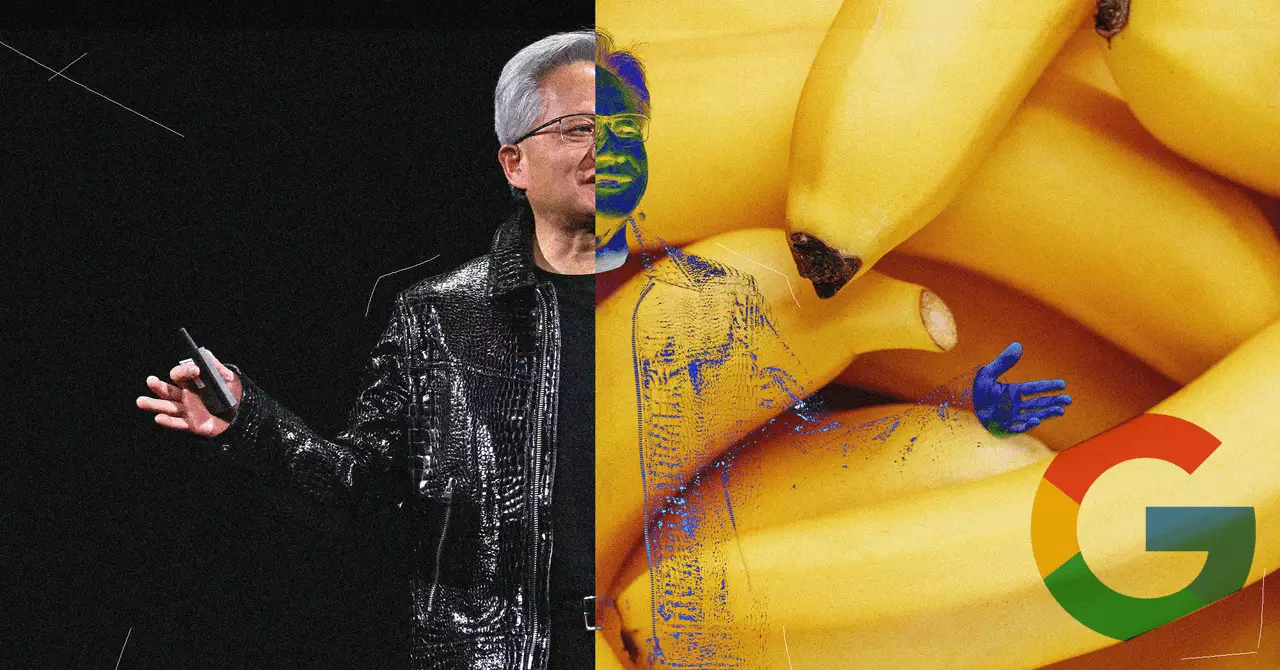Jensen Huang’s recent speech in London provides a compelling glimpse into his unwavering confidence in artificial intelligence’s transformative potential. As CEO of Nvidia, Huang exemplifies the visionary leadership necessary to propel AI from niche technology to a universal force. His playful endorsement of Nano Banana—an AI image generator—as “so good” indicates not just personal admiration but a broader belief in the disruptive power of innovative tools. Such enthusiasm is contagious and underscores the importance of charismatic advocacy in tech leadership. Huang’s ability to intertwine humor and conviction inspires a sense of optimism that AI entrepreneurs and enthusiasts alike can rally behind.
This kind of leadership is vital because it shatters the often overly cautious or skeptical narratives surrounding AI. Instead of dwelling on fears of obsolescence or misuse, Huang emphasizes the functional and societal benefits of these advancements. His assertion that AI will democratize access to knowledge and close societal divides is a powerful statement that reframes technology as a vehicle for social good rather than just a commercial asset. The boldness of his perspective — blending technological optimism with a social mission — pushes the industry toward a future where AI becomes an integral part of everyday life for all, not just the privileged few.
Strategic Investments Reinforce a Global AI Dominance
Huang’s dramatic $683 million investment in Nscale, a data center developer, signals a strategic move to cement Nvidia’s dominance in the burgeoning AI infrastructure arena. This move, along with investments from behemoths like OpenAI and Microsoft, underscores a collective push to build the technological backbone necessary for widespread AI deployment. These investments transcend mere financial gambles; they are about shaping the future landscape of digital infrastructure, ensuring Nvidia’s role at the core of this transformation.
What makes these investments so impactful is their projected scope. Huang estimates Nscale will create over $68 billion in revenue over six years—highlighting how AI infrastructure development isn’t just a tech upgrade but a new economic frontier. This enterprise underscores the importance of dedicated data centers and scalable hardware solutions. It’s an affirmation that AI’s future rests on robust, specialized infrastructure capable of supporting increasingly sophisticated models and applications. For industry observers, it signals that the race for AI dominance isn’t about quick wins but about long-term strategic positioning that will define the next decade of technological progress.
Personalized AI as a Catalyst for Human Productivity
Huang’s personal use of AI tools reveals a deeper narrative: AI is evolving from specialized applications into indispensable everyday companions that enhance human cognition and efficiency. His candid descriptions of using AI as a “thinking partner” and a tool that “saves a ton of time” demonstrate a profound transformation in how leaders view AI’s role in their lives. This intimate engagement with AI suggests an impending paradigm shift—where AI isn’t merely a tool but an extension of our reasoning and creative faculties.
His preference for various AI models tailored to specific tasks—Gemini for technical work, Grok for artistic pursuits, Perplexity for research, and ChatGPT for daily interactions—illustrates a future where AI is highly personalized. This multi-AI ecosystem creates a seamless augmentation of human capabilities, blurring the lines between human and machine cognition. It also raises questions about the ethical and social implications of such integrations—how much trust we place in these AI agents and what it means for human originality and agency.
Yet, Huang’s enthusiasm is rooted in the belief that such integration will ultimately democratize knowledge. His conviction that AI should be accessible to everyone stems from the idea that technology should eliminate disparities rather than exacerbate them. His vision involves not just technological innovation but a mission to ensure that the benefits of AI reach underserved communities. This outlook is optimistic but also demands a recognition of the challenges: how to democratize AI ethically, securely, and without amplifying existing inequalities.
Championing a Future of Inclusive Innovation
Huang’s rhetoric emphasizes that AI’s greatest promise lies in its potential to bridge societal gaps. His claims that AI could be the “single greatest opportunity” to close the technology divide are provocative but necessary in a landscape often fraught with fears of monopolization and exclusion. For AI to serve its role as a democratizing force, the industry must actively ensure that deployment and access are equitable.
This entails not only investing and innovating but also initiating policy and educational efforts geared toward inclusivity. Huang’s call to recognize the UK’s historical contributions to technological progress—ranging from the industrial revolution to DeepMind—underscores the importance of nurturing local talent and infrastructure. It’s a reminder that no nation or community should be left behind in the AI revolution. Instead, AI development must be inclusive, embracing diverse perspectives and addressing different societal needs.
In this context, Huang’s playful praise for the UK’s supposed culinary excellence and technological potential is more than humorous—it’s a strategic acknowledgment of the importance of local ecosystems. By fostering regional collaborations and investing in local talent, global tech giants can ensure that the benefits of AI are widespread. Such investment, combined with a moral commitment to equity, defines the true promise of AI as a force for global good.
—
Note: This article critically examines Jensen Huang’s leadership philosophy, strategic investments, personal engagement with AI, and societal vision, emphasizing that the future of AI depends on both technological innovation and a genuine commitment to inclusivity.


Leave a Reply